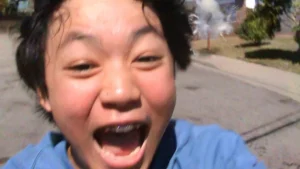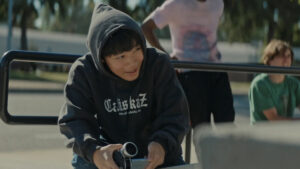Publication Date: 08-26-2024
Dìdi (弟弟) (2024) review
Dir. Sean Wang
By: Steve Pulaski
Rating: ★★★½
Being that Dìdi (弟弟) reminded me a great deal of Bo Burnham’s Eighth Grade, so much so you could consider it a sister film, I thought it wise to write my review of Sean Wang’s feature-length directorial debut in similar fashion. Since Dìdi is a essentially a collection of vignettes that shows one boy’s journey through middle school, I thought I’d structure my review as a collection of my own observations:

– Dìdi revolves around Chris Wang (Izaac Wang), who is referred to as “Dìdi” (Chinese for “younger brother) by his mother and “Wang Wang” by his friends. Chris is going through that never-easy transition from tweenhood to teenhood, and even in his mostly diverse neighborhood of Fremont, California, he still feels like an outcast. In particular, his friends of color, Farad (Raul Diad) and “Soup” (Aaron Chang), are starting to trade their roots for the kind of white male bro attitude that is extremely common at that age.
– The film is set in 2008, and feels every bit like a relic of its era. Kids have antiquated flip-phones with which they try and do more than said devices were capable of handling (rapid texting, shooting videos, etc). Chris crushes on a girl named Madi (Mahaela Park), whom he befriends at a party and later communicates with on AOL Instant Messenger. Some of Dìdi‘s strongest moments are when it assumes the “screenlife” style, confining its action to a computer screen. Chris and Madi communicate with the delightfully innocent yet cringeworthy brand of early text-speak.
– Sean Wang recalls one significant thing that occurred in 2008 that I remember fondly: the emergence of YouTube. Happenstance leads Chris to linking up with some older skateboarders, who are in need of a director for their rookie ollies. Chris jumps at the opportunity, even though his directorial skills are the equivalent of somebody shooting a video with a Razr with the intent of uploading it to WorldStar. This leads to a couple very inspired montage, somewhere between the guerilla videography of Larry Clark’s Kids and the polished compilations in Jonah Hill’s Mid90s.

– Chris blames a lot of his struggles with identity and interpersonal relationships on a variety of people. His relationship with his older, college-bound sister Vivian (Shirley Chen) is one ostensibly predicated on mutual contempt — “if you ever pee in my lotion again, I swear I will period in your mouth.” — until she starts to realize he’s deeply lonely. One of the sweetest scenes is when she gives him a lift to see his new skateboarder friends.
– His mother, Chungsing (Joan Chen), is also extremely clingy, but she herself is lonely too. She’s a failed painter who takes endless flack from her mother-in-law (Sean Wang’s real-life grandmother, Chang Li Hua, star of Wang’s Oscar-winning short Nǎi Nai & Wài Pó). Chris’ dad is off conducting business in Taiwan, leaving a male void in the house.
– Across the board, the performance are effective and genuine. Joan Chen has the look of a pained mother, who has failed in so many aspects in life that she quietly worries she’s failing her children as her control of them slips away. She has a lovely conversation with Chris late in the film that encapsulates her character beautifully, even if it is a little on-the-nose.

– Chang Li Hua effectively represents the older generation that doesn’t understand their younger counterparts and makes no effort to do so. However, her character arc does get lost in the third act, following what initially seems to be a significant development.
– Izaac Wang really shines here, cycling through a plethora of emotions with great poise for a young actor. Sparingly yet thoughtfully utilized is Shirley Chen, who also shines in moments that require tenderness and others that prompt malice.
– Sean Wang livens up the usual linear language of a coming-of-age movie. What could’ve been an inane sequence incorrectly portraying the effects of marijuana instead becomes a lively showcase of absurdist animation, complete with an animated squirrel voiced by Spike Jonze. Another moment where a dead fish starts talking to Chris shows how lost in one’s head one can be at such an impressionable age.

– Back to its use of screenlife: Dìdi nails not only the look and feel of late-era Myspace and early-era Facebook, but also how we (guilty) used to interact with them. Chris combs through Madi’s laundry list of favorite movies to pretend like he also loves A Walk to Remember. He later changes his ringtone to the song she has on her Myspace page. He devours scuzzy parody videos on YouTube. It all feels textured and lived-in.
– Some might balk at the casual anti-Asian racism that’s thrown around by Chris’ peers. I chalk this up to touchpoints Sean Wang himself experienced as a boy growing up in the mid-aughts. By the way, if you’re about 32-or-younger, have you purged some of the revolting things you likely posted on social media many moons ago?
– In its hyper-specificity, Dìdi achieves universal appeal and delight, although I do suspect men will find it a bit more relatable than women. In scenes where Chris tries to find his place with kids his age, and those older than him, such primal boyish behavior can only be summed up by one of my new, favorite phrases: “guys being dudes.” This is an ideal, low-key gem to end a rollercoaster summer at the movies.
Starring: Izaac Wang, Shirley Chen, Joan Chen, Chang Li Hua, Raul Dial, Aaron Chang, Mahaela Park, Chiron Denk, Sunil Maurillo, and Montay Boseman. Voiced by: Spike Jonze. Directed by: Sean Wang.
About Steve Pulaski
Steve Pulaski has been reviewing movies since 2009 for a barrage of different outlets. He graduated North Central College in 2018 and currently works as an on-air radio personality. He also hosts a weekly movie podcast called "Sleepless with Steve," dedicated to film and the film industry, on his YouTube channel. In addition to writing, he's a die-hard Chicago Bears fan and has two cats, appropriately named Siskel and Ebert!


